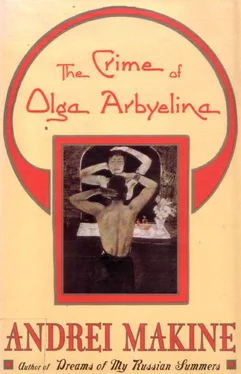One day, on a particularly cold morning, she went into the lower town in search of bread. As she left the Caravanserai she noticed that her own footprints on the smooth surface of the snow were the very first of the day. The bakery was closed; she had to go all the way up to the one located in the upper town, next to the church. She tried several times to button up the collar of her coat, but her numb fingers no longer obeyed her, and the wind came streaming in at her unbuttoned collar, up her sleeves. Speaking to the baker's wife, she suddenly felt dumb, her frozen lips articulating with great difficulty. The woman listened to her with the exaggerated and scornful patience people have for stammerers, then held out a round loaf to her. Olga did not dare to say that she had asked for something else. And all through the day at the corners of her mouth she retained that painful sensation of congealed words.
That night, for several eternal seconds, he slept pressed against the inert woman's body-against herself.
This, too, was one of those days lost between two calendars, a day of pale colors, hazy in the cold and the wind, a long twilight that lasted from dawn until dusk… As the night began she saw him appearing once more on the threshold of her room. She molded herself almost effortlessly into the temporary death that made her body limp. He lifted her arm carefully, to rearrange it, and it fell back with the soft heaviness of sleep. This death only required one thing of her: to feel totally removed from the stealthy rearrangement imposed on her body; from the caresses, barely perceptible and always seemingly amazed at themselves; from the whole slow and timid enchantment of gestures and held breaths. Yes, to distance herself from her body, to be intensely dead within it…
An infinitely remote sound, the chimes of a clock lost in the night, reached her in her death, woke her. Her eyelashes quivered, creating a fine, iridescent chink. She saw. A candle placed on the floor in a narrow china mug, the fierce flickering of the flames behind the stove door… And these two naked beings that she contemplated with a gaze still removed, external, like someone observing them from outside, through the window. The body of a woman lying on her back, tall, beautiful, in perfect repose. And, like a bowstring suddenly slackened, the body of a youth, fragile and very pale, stretched out on its side, the head tilted back, the mouth half open. He was asleep…
During the few moments that this sleep lasted, she had the time to grasp everything. Or rather all that she would sense next morning and reflect on in the course of the days that followed, all already foreseen, was condensed in her eyes, still dazzled by their ability to remain wide open. She understood the tiredness beyond human endurance of this young body, the exhaustion accumulated over weeks, months. This brief, trancelike swoon after countless nights of wakefulness. Thanks to this momentary collapse, she believed she could plumb the abyss he bore within himself, without ever letting anything show. He had fallen asleep as children do, in midgesture, in midword… The distant striking of the hours fell silent. Now there was just the tinkling of crystals against the window, gusts of invisible air coming warm from the fire and cold from the window, and the subtle scent of burning wood. And these two naked bodies. Located beyond words, outside all judgment. The mind could brush against them, situate their whiteness in the shadows, in the silence, in the penetrating aroma from the fire; but shattered against the threshold beyond which it could articulate nothing more.
From very far away, a few seconds after the first chimes, came a response: the same twelve strokes, now stilled, now heightened by the wind. She quickly closed her eyes again. He got up so swiftly that he gave the impression of flying as he crossed the room, snatched up the coat and the candle, and pulled open the door…
His sleep had lasted for as long as the interval between midnight striking and its echo on a New Year's Eve that existed only in the old calendar.
On the day after that phantom New Year's Eve the morning began for her well before daybreak, still in the confused sleepiness of the night, with its long smoky flame flickering on the stub of a melted candle. Padding about, she came and went in the bedroom, opened boxes filled with letters and old papers, sifted through them, and threw most of them into a plywood chest beside the stove where everything accumulated that could be used to stoke the fire. The empty space that was gradually cleared on top of the closet, hitherto piled high with these cardboard boxes, afforded her a vague but real delight. The feeling you have before an impending journey or moving house…
She heard her son opening the front door and walking down the wooden steps-some slivers of ice between the planks creaked under his feet. Hidden by the curtain, she watched him all along the footpath as he followed it. Who was he?
A youth clad in an overcoat too broad and still too long for him. Was he her son who would greet the occupants of the Caravanserai he encountered, as well as some French people he knew in the upper town, receiving their greetings in the most natural way in the world? Or was he that unrecognizable young being in a fleeting moment of sleep spent beside a woman's body at night in this room, as it flickered and swayed in the light of a candle placed on the ground?
When her eyes had got used to the rhythm of this figure's tread as he walked beside the wall, she noticed that at each step his foot, his heel seemed to be stamping on the frozen footpath in anger. She just managed to suppress the thought that was already spreading like acid: "He's limping…" The words cut off. Now she remembered that in the night, when observing this fragile body stretched out beside her own, she had noticed a blue and yellow mark around the knee, the trace of the last hematoma… As a gust of wind blew open the panels of his coat his silhouette broadened and disappeared around the corner of the building. Again she imagined all the faces the boy's eyes would encounter on the road and in the town. They bore a strange resemblance to the outraged and disdainful ones that she pictured one day condemning the life they led as this odd couple. It was then that she murmured harshly, while intending something other than these half-irrational words, "To hell with them all, with their chimes and their bakeries! They'll never understand…"
The next day the postman did not deliver the newspapers subscribed to by the library at the Caravanserai. Some of the rare readers, who were still braving the cold and the snow-covered paths, spoke of a journalists' strike, or a printers' strike, nobody knew exactly what. The postman repeated his explanation three or four more times and in the end they stopped noticing the absence of news… The train that went to Paris every morning suffered several delays as a result of snowfalls and one fine day (it was said that ice had warped the joints on the track) it stayed immobilized all day. Henceforth the capital and the outside world seemed improbable places. Power cuts plunged even the upper town into darkness from six o'clock in the evening. As for the fortress, the old brewery, the people of Villiers took to wondering if it was still inhabited.
The library often remained deserted. Nor was anyone ever seen in the courtyard that was strewn with the humps of snowdrifts. Entrenched in their homes, the occupants spent these brief twilit days on the alert for the slightest sounds in the corridors, and trying to interpret them, picturing one another shivering as they kept watch under a blanket or with a shoulder pressed against the stone of a meagerly heated stove. And if they did appear in the library it was only to leave again almost at once, without even telling their usual stories, simply embellishing this information, culled from a newspaper a week old: "The coldest winter for eighty years… For a hundred years… For a hundred and twenty years…"
Читать дальше












